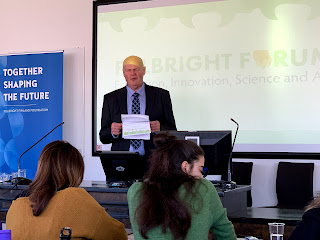On March 11, 2019 I attended the Fulbright Forum at the University of Helsinki to hear American Fulbright teachers share the topics they are researching. We also met with an Assistant Dean to learn about the Finnish higher education system. Afterward, we attended a reception and were able to mingle with the Fulbright American teachers/researchers and learn more about their work.



Random Notes from Fulbright Forum:
- Higher education in Finland is free.
- There is an emphasis on student choice in education.
- Things to see in classrooms: Choice, dialogue, movement, trust, developmental activities.
- Principals don't often go into classrooms. Some principals make the coffee for staff.
- Key findings in Finnish classrooms: Trust, flexibility, rhythm of the day, strong textbooks, respect for individual, hands-on, self-assessment, choice and planning, responsibility.
- Students are taught to play and socialize.
- Finland has a culture of equity. Everyone below the president goes by their first name. There is no word for Mr. or Ms. Everyone goes by their first names.
- There is no word for please. It is not a necessary word. They are concise. A story was shared about an American checking out at a store and the salesperson never making eye contact, overseeing the exchange, and handing the customer a receipt. The American said, "Aren't you going to at least say "thank you?" The salesperson responded, "It says that on the receipt."
- When out walking and bicycling people do not make eye contact or greet one another. Instead, they respect the privacy and space of one another.
- There is no tracking in the schools in the primary grades and lower secondary. Their system after 9th grade has students choose between a path for upper secondary school or vocational school. There are exams to take to qualify for upper secondary school. There are no "dead ends." This means that you can complete a vocational education and then go back into an academic program, college.
- "Part time special education is the secret weapon of Finnish education." (Hmmm? VJ)
- One finish educator said, "I don't teach, I'm present and available."
- Matthew Freedman ideas:
- Think about ways to un-build generations of social and emotional damage.
- Bulletin Board: I AM NOT ______ (criminal, etc.)
- Bulletin Board: Before I die ________
- Freshman - Senior interviews (They learn about human paths, not just academic. They have a couple of days..no time limits.)
- Senior Talks - Ideas Worth Sharing. Seniors build up to giving a talk at the end of their senior year. This has been a game changer for Matthew's school. They have a night of senior talks at a college auditorium. They are able to share their cultures and upbringings.
- Ideas to steal from Finland: cultural competence mini-games, cultural competence scenario card games.
- Primary grades, 1st-3rd have 3 hour day with many breaks
- Upper Secondary schools are more college like. Students build their schedules. They have gaps in their schedules. They can play ping pong, etc.
- VJ Lunch Reflection Ideas: Have 8th grade interviewed by 6th grade, look at teacher volunteer mentor models for at-risk students (not in their class..about 30 total at school example).
- Phenomenon based learning and multidisciplinary learning have some overlap, as do Finland's Transversal Skills and the US' 21 Century Skills.
- Robyn Young Special Education presentation:
- Students are identified based on one or more of the 13 federal disability categories.
- Students with moderate or severe needs get services outside of the basic education buildings. They do not have intensive SPED needs in Inclusion.
- Evidence Based Practices are being practiced in Finland.
- Equity is a priority in Finland
- The humanity of each child is not lost in the system. Teacher training is collaborative, interactive. Teachers contribute to curriculum.
- Growth mindset is ingrained in Finnish culture.
- PLAY
- Play principles are built into the Finnish system.
- Autonomy
- self-regulation
- Trust
- Love
- The focus is on process.
- There is minimal hierarchy
- Well-being is a priority
- They are currently wrestling with how to manage refugee populations moving in and wanting to get ahead of it so they do not have similar problems as Sweden.

Finnish Teacher Education - University of Helsinki - Arto Kallioniemi - Vice Dean.
- Education starts at 7 years old, primary education is grades 1-6. They offer school before grade 1 (daycare, preschool, Kindergarten)
- Primary education teachers teach all subject areas.
- Students walk or bike to school, there is no school bus. If they take a bus, it is public transportation.
- 5 hour school day
- 190 school days
- Secondary school teachers typically specialize in two subjects, a main subject and a minor subject.
- Cornerstones of Finnish Education:
- A.
- Common, consistent, and long term policy
- Basic model for teacher and compulsory education are 40 years old.
- National curriculum reform every 10 years. (1985, 1994, 2004, 2014/16)
- B. Education Equity
- Compulsory education mainly organized in public schools, free books, meals.
- Two languages are taught by law, Finnish and Swedish. English begins in 3rd grade and may begin in 1st grade.
- C. Decision Power is at local level
- Teachers, schools, local authorities plan local curriculum...
- D. The Culture of Trust
- Teaching is highly competitive. Only 3% of applications qualify for program. (1449 candidates, 104 graduate.)
- 20% of teachers in Finland are male.


No comments:
Post a Comment